Related Research Articles

Chiang Kai-shek was a Chinese politician, revolutionary, and military leader who served as the leader of the Republic of China (ROC) and the Generalissimo of the National Revolutionary Army. He held these positions in mainland China from 1928 until 1949, when his nationalist Kuomintang (KMT) party was defeated in the Chinese Civil War by the Chinese Communist Party (CCP)—thereafter, he led the remnant of the ROC government on the island of Taiwan until his death in 1975.

Soong Mei-ling, also known as Madame Chiang Kai-shek or Madame Chiang, was a Chinese political figure who was First Lady of the Republic of China, the wife of President Chiang Kai-shek of the Republic of China. Soong played a prominent role in the politics of the Republic of China and was the sister-in-law of Sun Yat-sen, the founder and the leader of the Republic of China. She was active in the civic life of her country and held many honorary and active positions, including chairwoman of Fu Jen Catholic University. During World War II, she rallied against the Japanese; and in 1943 conducted an eight-month speaking tour of the United States to gain support.

The Soong sisters, Soong Ai-ling, Soong Ching-ling, and Soong Mei-ling, were three sisters from Wenchang city, Hainan island. Raised as Christians and educated in America, the sisters all married powerful men, respectively, H. H. Kung, Sun Yat Sen, and Chiang Kai-shek. Along with their husbands, they became among China's most significant political figures of the early 20th century.

Chiang Ching-kuo was a Chinese politician of the Republic of China. The eldest and only biological son of Generalissimo Chiang Kai-shek, he held numerous posts in the government of the Republic of China and ended martial law in 1987. He served as premier of the Republic of China between 1972 and 1978 and was president of the Republic of China from 1978 until his death in 1988.
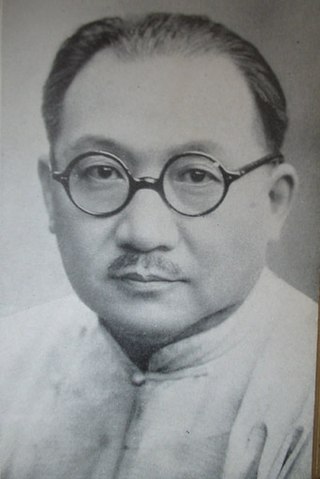
Kung Hsiang-hsi, often known as Dr. H. H. Kung, also known as Dr. Chauncey Kung, was a Chinese banker and politician in the early 20th century. He married Soong Ai-ling, the eldest of the three Soong sisters; the other two married President Sun Yat-sen and President Chiang Kai-shek. Together with his brother-in-law, Soong Tse-ven, he was highly influential in determining the economic policies of the Kuomintang-led Nationalist government of the Republic of China in the 1930s and 1940s.
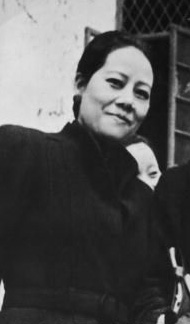
Soong Ai-ling, legally Soong E-ling or Eling Soong, was a Chinese businesswoman, the eldest of the Soong sisters and the wife of H. H. Kung, who was the richest man in the early 20th century Republic of China. The first character of her given name is written as 靄 in some texts. Her Christian name was Nancy.

Soong Tse-vung, more commonly romanized as Soong Tse-ven or Soong Tzu-wen, was a Chinese businessman, banker, and politician who served as Premier of the Republic of China between 1945 and 1947.

Song is the pinyin transliteration of the Chinese family name 宋. It is transliterated as Sung in Wade-Giles, and Soong is also a common transliteration. In addition to being a common surname, it is also the name of a Chinese dynasty, the Song dynasty, written with the same character.

The New Life Movement was a government-led civic campaign in the 1930s Republic of China to promote cultural reform and Neo-Confucian social morality and to ultimately unite China under a centralised ideology following the emergence of ideological challenges to the status quo. Chiang Kai-shek as head of the government and the Chinese Nationalist Party launched the initiative on 19 February 1934 as part of an anti-Communist campaign, and soon enlarged the campaign to target the whole nation.

Cihu Mausoleum, officially known as the Mausoleum of Late President Chiang or President Chiang Kai-shek Mausoleum, is the temporary resting place of President Chiang Kai-shek. It is located in Daxi District, Taoyuan City, Taiwan. When Chiang Kai-shek died in 1975, he was not buried in the traditional Chinese fashion but entombed in a black marble sarcophagus, since he expressed the wish to be eventually buried in his native Fenghua in Zhejiang province once the Kuomintang (KMT) recovered mainland China from the Communists.
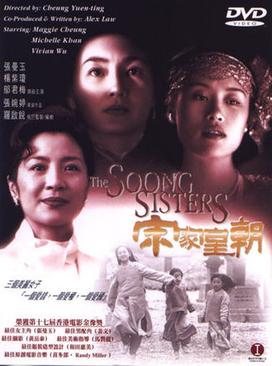
The Soong Sisters is a 1997 Hong Kong historical drama film based on the lives of the Soong sisters from 1911 to 1949. The three sisters married the most important historical figures – Sun Yat-sen, Chiang Kai-shek and K'ung Hsiang-hsi – in the founding of the Republic of China, making their family the focal point of every major decision made in modern Chinese history. Directed by Mabel Cheung, the film starred Maggie Cheung, Michelle Yeoh and Vivian Wu as the sisters. The screenplay was written by Mabel Cheung's husband, Alex Law, whom she frequently collaborates with.
The CC Clique, or Central Club Clique, was one of the political factions within the Kuomintang, in the Republic of China (1912–49). It was led by the brothers Chen Guofu and Chen Lifu, friends of Chiang Kai-shek.

The Founding of a Republic is a Chinese historical drama produced in 2009 to mark the 60th anniversary of the People's Republic of China and was made to portray the final years of the Chinese Communist Revolution that followed the end of the Second Sino-Japanese War (1937-1945). This film was co-directed by Huang Jianxin and Han Sanping, and includes many famous actors such as Andy Lau, Ge You, as well as other directors such as Jiang Wen, and Chen Kaige. The main protagonists Mao Zedong and Chiang Kai-shek were played by highly renowned actors, Tang Guoqiang and Zhang Guoli. One of the purposes of this movie aside from reenacting the events of the Chinese Communist Revolution was to also attract a younger audience to view films that revolved around government propaganda, which they aim to accomplish by including famous actors that would draw the attention of the youth. According to the executive at one of China's top multiplex chains, this film is also unique because the film unusually marries "the core of an 'ethically inspiring' film with commercial packaging.". Additionally, this is the first zhuxuanlu film to work solely with cinematic audio-visual methods to achieve its political and ideological goals. It is a milestone in that since its production in 2009, the distinction between zhuxuanlu and commercial film has become blurred; they have become primarily indistinguishable from each other. This film was released on September 16, 2009, in mainland China and during its release, it had a tremendous amount of support from the Communist Party.

The Shilin Official Residence is the former residence of late Republic of China President Chiang Kai-shek located on Zhongshan North Road in Shilin District, Taipei, Taiwan.
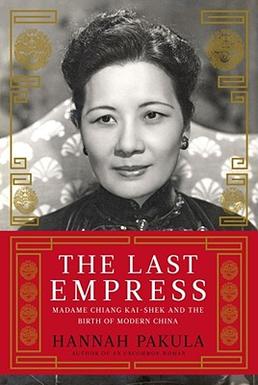
The Last Empress: Madame Chiang Kai-shek and the Birth of Modern China is a 2009 biography of Soong Mei-ling, wife of Kuomintang leader and President of the Republic of China Chiang Kai-shek written by Hannah Pakula. The book was widely reviewed as extensively researched and strongly put forward the argument that Madame Chiang and her husband have not been given the credit they deserve in shaping the modern Chinese nation. It has been translated into Chinese in two editions, one in Taiwan and one in Beijing, both by the same translator.

McTyeire School was a private girls' school in Shanghai.
Mao Zedong is a 2013 Chinese epic biographical television series which dramatises the life of Mao Zedong, former Chairman of the Chinese Communist Party and the main founder of the People's Republic of China. It was directed by Gao Xixi, and starred Tang Guoqiang, Liu Jing, Li Bowen, Guo Lianwen, and Wang Wufu. The television series was released in 2013 to mark the 120th anniversary of the birth of Mao Zedong.
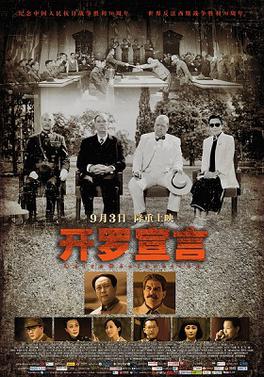
Cairo Declaration is a 2015 Chinese 2D historical film directed by Wen Deguang and Hu Minggang and written by Liu Xing. The film stars Hu Jun, Cecilia Han, Ma Xiaowei, and Tang Guoqiang. The film was scheduled to be released on September 3, 2015.

Guling, formerly romanized as Kuling, is a summer resort located on top of Mount Lu in Jiujiang, Jiangxi Province, China. It was formerly a resort reserved for European missionaries. Now it is the tourist and administration center of the Lushan Geopark, a World Heritage Site.
References
- ↑ Worth, Thibault (2007-09-06). "Book sheds light on Madame Chiang". Taiwan Today. Archived from the original on 2024-01-29. Retrieved 2021-09-06.
- ↑ Faison, Seth (2006-11-10). "Makings of China's epic madame". Los Angeles Times. Archived from the original on 2021-09-06. Retrieved 2021-09-06.
- ↑ "Madame Chiang Kai-shek (Book summary)". www.goodreads.com. Retrieved 2021-09-06.